July 22, 2024:
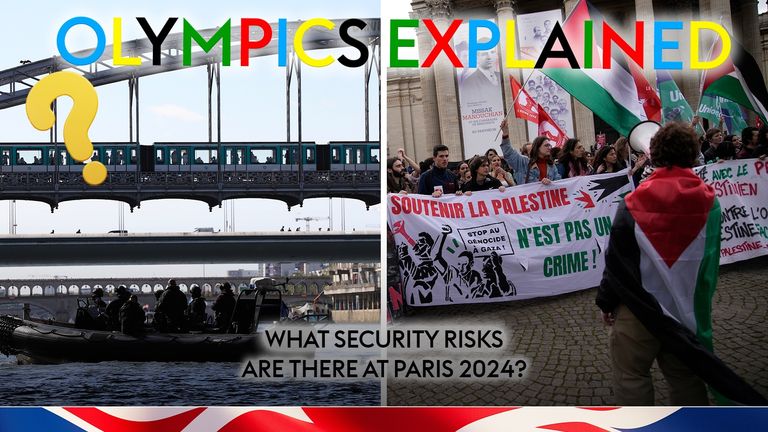
Sky Sports News reporter Hughes details the security risks that will be present at the Paris Olympics
It was in the Peruvian capital Lima on July 31, 2017 that Paris knew they’d got what they wanted. They had the Olympic Games again.
As the great and the good of the Olympic movement met in Peru to decide who would host the Games in 2024 and 2028, the French knew they were in with a good shout of being successful. It was basically a straight fight between them and the USA.
The French had lost out to London in 2012, but despite that disappointment, those who wanted Paris to host a Games again secured it so that they would again entertain the best athletes on the planet 100 years on from when they last held the ‘Greatest Show on Earth.’
The IOC awarded Paris the 2024 Games and the Los Angeles the 2028 edition.
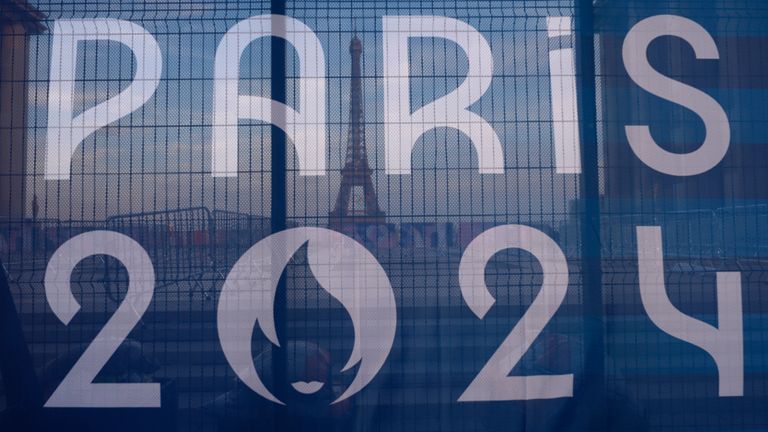
Paris was awarded the 2024 Olympic Games back in 2017
Venue-wise, this is a Games where we are not regularly reporting on issues surrounding the readiness of competition venues or athletes villages. We have been there before, but not for Paris.
The vast majority of the facilities being used were already here. For example the 80,000 seater Stade de France will host the athletics during the second week of the Games. Any refurbishment or new venue has been completed or built and tested some time in advance. Many venues are temporary, perhaps one of the most eye-catching will be the Beach-volleyball stadia which sits in the Champs de Mars, right by the Eiffel Tower.
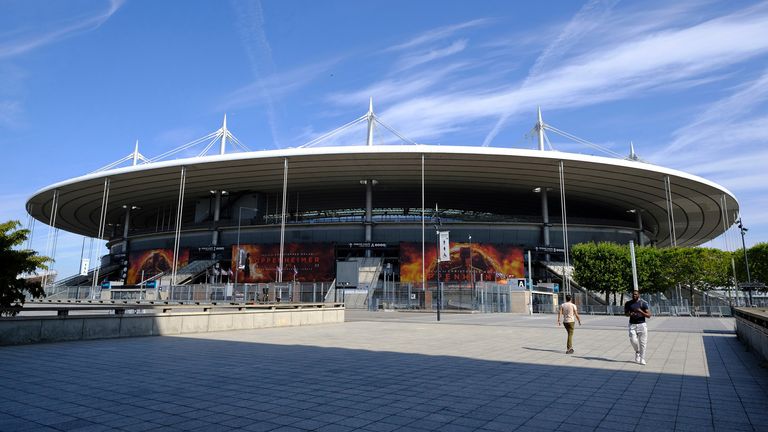
The Stade de France is where the athletics and closing ceremonies of the Paris Olympics will be held
You would think cleanliness might not be an issue Paris as one of the world’s great cities would have to contend with, but for these Games the cleanliness of the artery through the City – the River Seine – has become one of great debate.
Olympic organisers want the River to be a focal point for the Games. The Opening Ceremony will take place along a 6km stretch of it while the swimming leg of the triathlon and the marathon (Open Water) swimming events are set to take place in the Seine. The problem was always going to be could organisers and the City of Paris get the River clean enough?
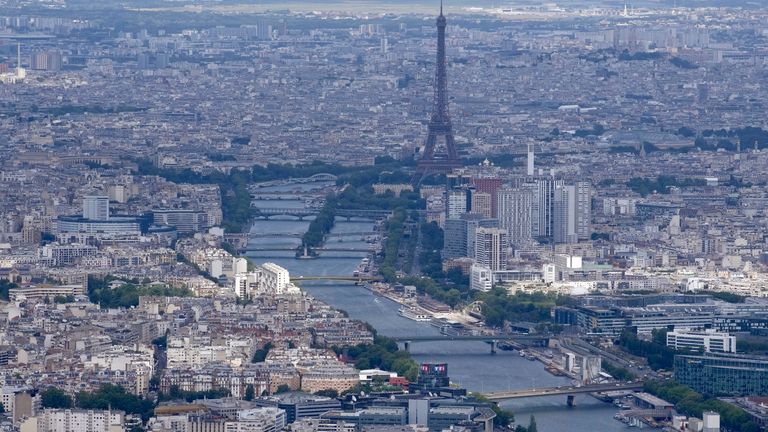
The River Seine in Paris and its cleanliness in has become a major topic of intrigue
For the past 100 years no swimming has been allowed in the river because it was too dirty. After a 1bn Euro programme to improve sewers and water quality, they’d hoped to get the water quality signed off, but due to the wet autumn, winter and spring, the excess rainwater and run-off has had a detrimental effect on the River. Only recently once the sun has begun to shine and the rain abate have water qualify readings come within the limits set for the River to be declared ‘clean’.
As you can imagine there is some scepticism over water quality so it’s led to some PR campaigns to change minds – most recently the Mayor of Paris, Anne Hildago took a dip in the Seine to declare to the world that it’s ‘clean’.
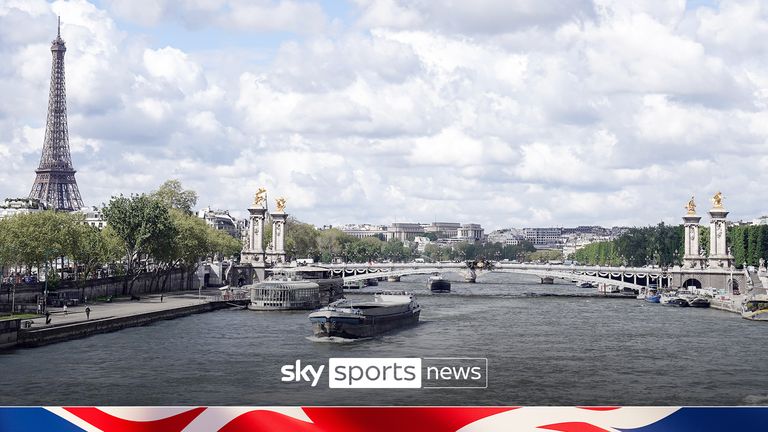
Former Olympic triathlete Alistair Brownlee says he has no concerns with the water quality in the Seine after the city spent over £1bn making them fit to hold the open-swimming events at the Olympics and Paralympics
I arrived in Paris recently and my greatest surprise was just how quiet the city was. I was standing yards from the iconic Arc de Triomphe where usually the traffic rushes around it. I could count the cars and buses on the fingers on my hands. It was so quiet.
Why? Paris has in part locked down. Many Parisians leave the city anyway during the summer months, but more have gone away than usual, while a limit on the number of vehicles and which vehicles can come into the central parts of Paris is in force. Basically the only vehicles I’ve seen are taxis, buses and numerous police cars and motorbikes.
Venue readiness is one thing, being ready to welcome in excess of 10,000 athletes and millions of people coming to either work or watch the Games is another, though.
Due to heightened security risks, the Paris and French national authorities are on the highest level possible. They have had to plan for the worst scenarios – and by that I mean a terrorist attack – and then work back to make sure everyone is as safe as possible.
The police, security and military authorities are not taking any risks. Publicly two alleged threats to the Games have already been prevented. In April a 16-year-old was arrested after he’d said on social media he wanted to attack the Games, while in May an 18-year-old was arrested in Saint-Etienne for allegedly plotting an attack at a football stadium hosting matches during the Olympics.
Anecdotally from what I have seen so far in my time in Paris and from previous visits over the last 12 months, visibly there appears to be so many more police officers on duty. The authorities confirmed this earlier in the year, but when you see an officer almost every few hundred yards it really does lodge in the brain just how many ‘visible’ officers are on duty.
Despite the global IT outage problems caused by the Crowdstrike software update which did affect the IOC and their Olympic IT systems, everyone competing, working or watching the Games has a digital footprint that can be traced. To get anywhere in Paris in or around an Olympic Venue you require accreditation, a ticket or a pass. If you don’t get a green tick you don’t come through. The authorities want to and will know exactly where everyone is.
A prime example is the Opening Ceremony along the River Seine. Originally Paris 2024 wanted a crowd of 700,000 people to freely watch the Olympic Teams procession along the river. The security forces stopped that, and now it’s a crowd of 300,000 and everyone watching – from media to public – has to have ticket or a pass to get through outer security checks.
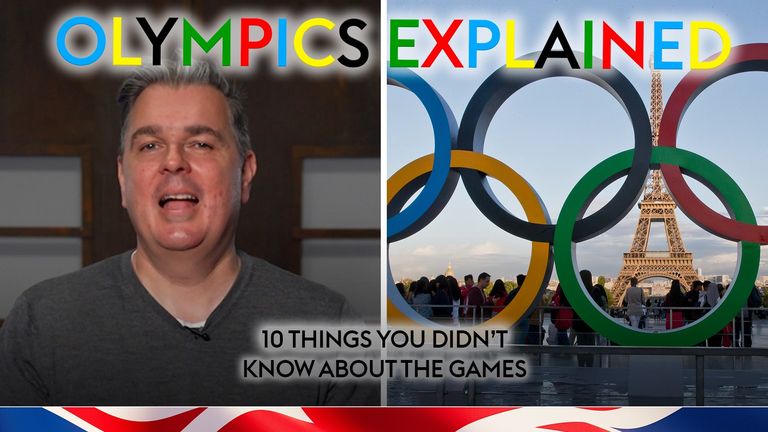
Sky Sports News’ Hughes details 10 things you may not have known about the Olympic Games
Protests are also an issue the authorities are planning to have to deal with and they may come in many different forms. The conflict in Gaza and the French Government’s position has raised tensions within many communities in France and with the eyes of the world’s media upon Paris, it is seen as a potential opportune moment to protest.
Protests on domestic issues have also had to be planned for. Over the course of the last few years, it is not uncommon to see French farmers block major roads and motorways in and around Paris with their tractors and farm machinery to demonstrate their grievances with either the French Government or the European Union. Whatever the form of protest, it is a headache for the security forces who will have to move valuable resources to safely cover those protests should they happen.
Whatever the risk and whatever the planning, Paris 2024 organisers were asked in an interview with Sky Sports in February: “Can you guarantee the safety of everyone at the Olympics?” The answer was pointedly not an immediate ‘yes’.
France has been in some turmoil in recent months. It is not the build-up to the Paris Olympics anyone organising the Games, the IOC or French Government wanted.
The recent French General Elections held over two rounds of voting saw incumbent French President Emmanuel Macron take a huge political gamble that backfired. A surge in votes for the far-right National Rally followed by a scramble to power of sorts by an alliance of the left-wing New Popular Front has put France into stasis politically.
While President Macron’s position as president is unaffected, right now it is essentially a temporary government in charge, the status quo remains. This may actually help the Olympics as nothing can be done right now. We are in a period of calm perhaps before further storms and while Paris 2024 remains in this calm period they will be immensely grateful.
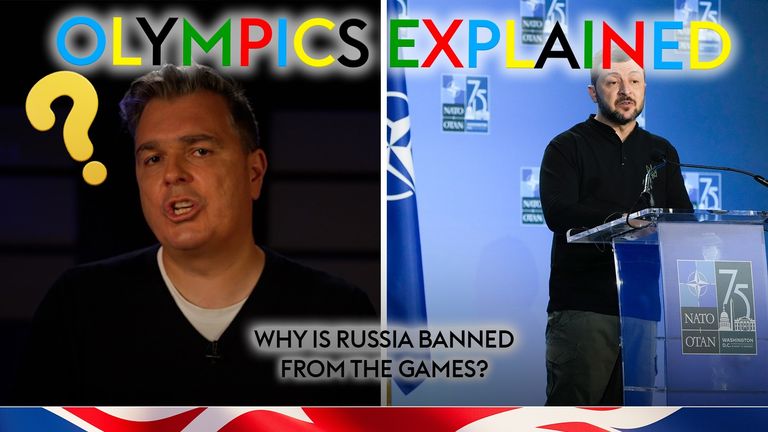
Sky Sports News’ Hughes explains why Russia isn’t allowed to compete at the Paris Olympics
Let’s make this clear from the off – Russia along with Belarus have been banned from competing at Paris 2024. That decision can only be made by the International Olympic Committee (IOC).
Russia’s invasion of Ukraine along with support from Belarus has meant those two countries remain pariahs as far as the majority viewpoint of the IOC and hundreds of National Olympic Committees go.
Practically what does that actually mean? No Russian or Belarus athlete can compete in Paris wearing their national attire, logo or flag. No flag can be flown, no national anthem sung. Neither Russia nor Belarus can effectively be acknowledged… but to the annoyance of several nations and athletes, Russians and Belarusians can compete in Paris as neutrals.
What that means is that athletes who hold a Russian or Belarus passport, who have no connection to the military in their respective country, have not expressed any support for the war in Ukraine and are effectively separated from the conflict, can compete as neutrals. Selection for Paris comes down to each individual sporting federation, not the Russian or Belarus Olympic Committee.
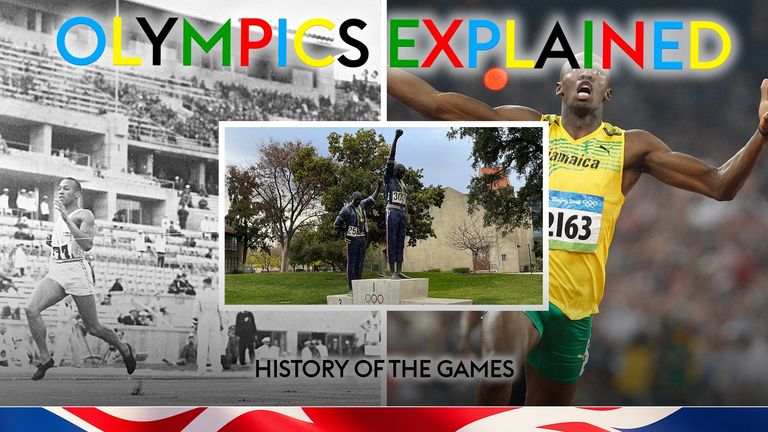
With the 33rd edition of the Olympics coming up in Paris, Sky Sports News’ Hughes provides a brief history of the Games
So what does this practically mean though in terms of numbers? Very few, in fact just 16 Russians and 17 Belarussian athletes have been able to accept invitations to compete at Paris 2024 as neutral athletes.
If no constraints had been placed on either Olympic Team it’s been estimated that a combined number of somewhere between 400-550 athletes from those countries may have made it.
Now the IOC has issued the term ‘Individual Neutral Athlete ‘ (AIN) – the 33 athletes from Russia and Belarus will come under a specially designed flag with their own anthem. They are not allowed to use the flags of Russia, Belarus or the Olympic flag. The delegation is also banned from attending the Opening and Closing Ceremony nor be listed on the Medal Table.
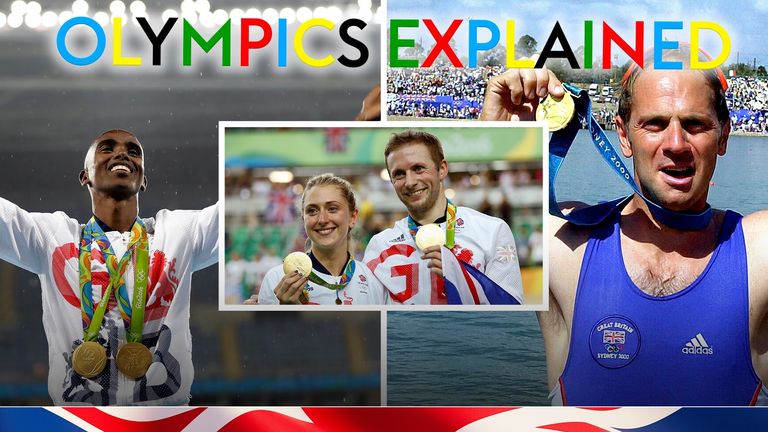
Sky Sports News’ Miriam Walker-Khan reveals which sports have contributed most to Team GB’s success at previous Olympics
Some are household names and multiple Olympic Gold medallists already. Others may be less well-known, but serial medallists on the World stage, while there’s also a rather cool Cornish 16-year-old whose desire to win gold would mean her mum would let her get a tattoo.
Keely Hodgkinson
The fastest 800m runner in the world this year. She’s fearless, driven and at just 22 years of age already got a medal cabinet bursting at the seams.
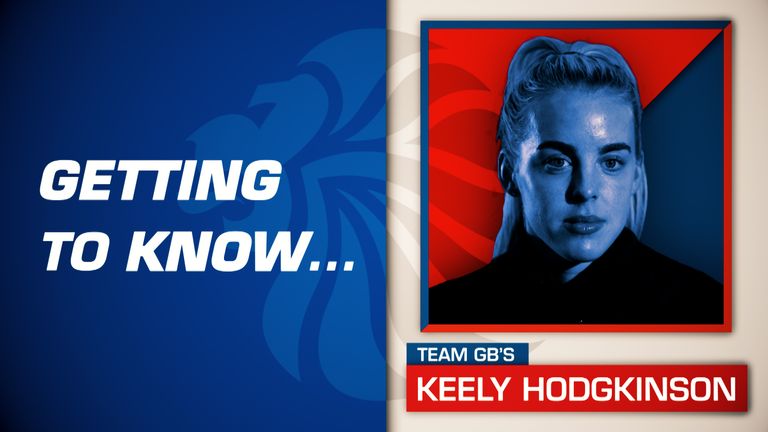
Favourite Olympics memory? Biggest inspiration? Get to know Olympic and World silver medallist Keely Hodgkinson as she prepares for the Paris Games this summer
At the Tokyo Games she announced herself to the world by taking silver. Since then two further World Championships silvers and two European Golds. Her greatest rival Athing Mu from the USA didn’t qualify for the Games, but even if she had, Keely is on a mission to take Gold. If she remains fit and healthy, not even Mu if she were in Paris, can touch her.
Her coaches – husband and wife Trevor Painter and Jenny Meadows – are so down to earth and treat Keely like one of their own children. They’re one big factor in backing Hodgkinson.
Max Whitlock
Again, an obvious choice. But Whitlock is 31, which is old for a gymnast. He’s already won three gold medals and wants to end his career with gold number 4 at Games number four.
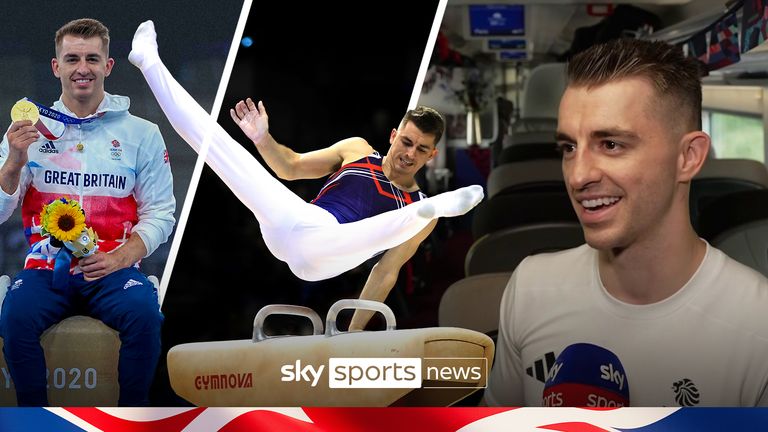
Team GB’s Max Whitlock says another gold is a ‘massive motivation’ for him at Paris 2024
He’s a legend of the sport. No one can touch him with his pommel horse record at the Olympics. Despite a body that is pushed physically to its limit, Whitlock’s eyes tell a story. He’s determined, fired up, but has the know-how and natural talent. Like Keely Hodgkinson as well a more down-to-earth bloke you can’t hope to meet.
Adam Peaty
Yes I know, you’re thinking: ‘Adam Peaty!? Of course he’ll win gold’ – He is a swimming machine and has won 100m breaststroke gold at the last two Olympics. He has redefined breaststroke breaking 14 world records and swimming a number of ‘firsts’.
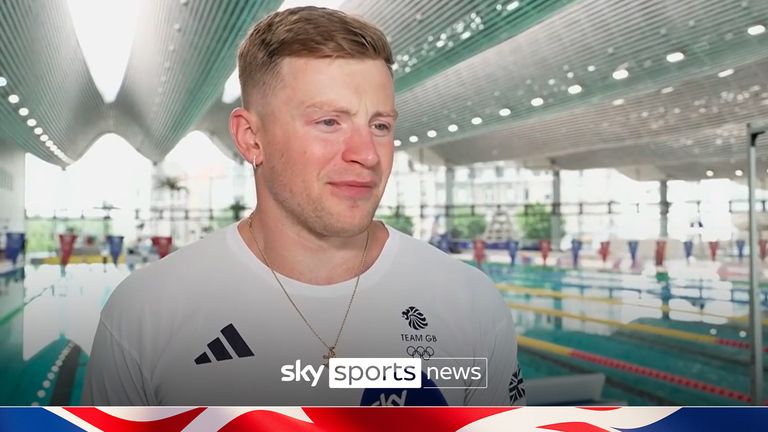
Adam Peaty says winning a third individual gold medal would be his greatest achievement and he’s hinted that this year’s games could be his last
The reason why this Games is so intriguing is that he took time away from the sport to conquer issues with alcohol and depression, then decided to get back into the pool. You can’t just automatically be great so Peaty has had to work hard, and be gruelling physically to get himself to the best he can be. He doesn’t even yet know if he’s got back to or beyond his peak. In a recent interview with Sky Sports, he said; “I’ll know once I’ve done the heats. I’ll know then.”
Joe Clarke
You may not know Joe. But he’s a world-class canoeist and has been for years. He also shares a common trait with all the athletes I’ve selected, he has eyes filled with fire and determination. It doesn’t matter how many medals he may have won, what matters only to him is what’s next.
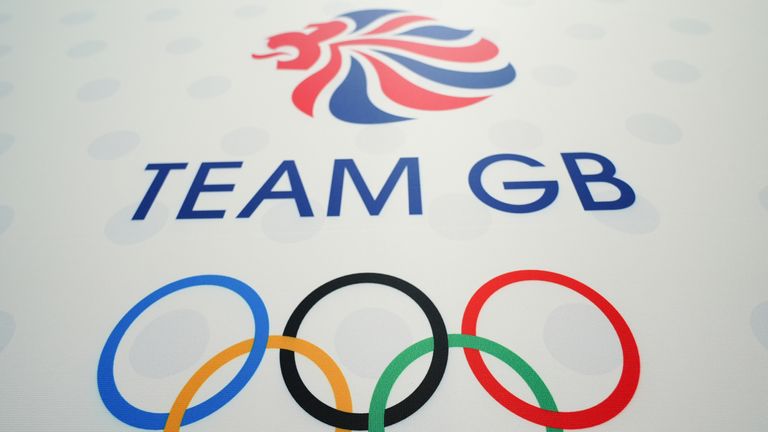
He’s the most successful kayak cross athlete ever winning too many medals for me to mention. He won Gold at the Rio Games on 2016 in the K1 event, but for the Tokyo Olympics he somehow didn’t qualify and that annoys Clarke. Cue that driven mentality and when he gets onto the water in Paris, few will be able to match him.
Lola Tambling
The youngest competitor of my selection at 16. Yet she’s not the youngest on the Team GB skateboarding squad. Sky Brown is a year younger. Lola though has the results to prove she’s ready to achieve big things at Paris while she has a character that exudes coolness.
Fierce and fearless, she knocked herself out briefly in an Olympic qualifier yet dusted herself down and went on to do the business to get to Paris. Should she win gold or any colour of medal, you’ll not see a wider smile or with her lovely Cornish accent, hear a better post-race interview.